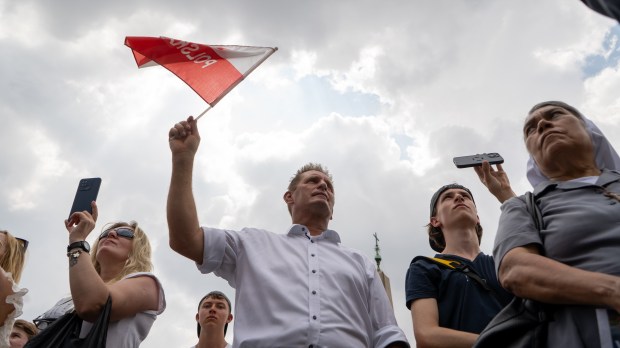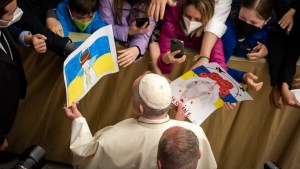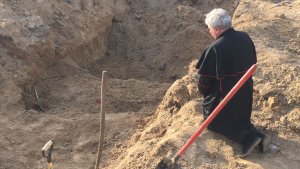By most accounts, Poles have welcomed refugees from Ukraine with open arms over the past 16 months. Many of the millions of Ukrainians fleeing Russia’s invasion have been taken in by Polish families and churches. Many have found temporary employment in Polish towns and cities.
But many older Poles still have bitter memories from an earlier conflict and still hold deep resentment of actions taken by Ukrainian nationalists trying to establish an independent state on lands where Poles lived.
This weekend, Poles and Ukrainians are marking the 80th anniversary of the Volhynia Massacre, in which the Ukrainian Insurgent Army (UPA) took the lives of tens of thousands of Polish civilians living in Nazi-occupied Poland, with the support of parts of the local Ukrainian populace. An estimated 50,000 to 100,000 civilians lost their lives.
Reconciliation efforts have been underway for some 50 years, with the Church taking a leading role. On Friday, July 7, those efforts culminated with the signing of a Joint Statement of Forgiveness and Reconciliation between the Polish and Ukrainian peoples. Church leaders from both countries – His Beatitude Sviatoslav Shevchuk, Father and Head of the Ukrainian Greek Catholic Church and Archbishop Stanislaw Gądecki, President of the Polish Bishops’ Conference – affixed their signatures to the document and prayed during a service in the Cathedral of St. John the Baptist in Warsaw.
“The history of relations between the Polish and Ukrainian peoples is full of wonderful, kind, and heroic deeds, but unfortunately, also turbulent and dramatic events,” reads the Statement, which notes the Polish and Ukrainian people’s common Christian roots.
Bucha’s impact
An earlier Declaration of Reconciliation, signed in 2013, spoke about the Volhynia Massacre as “murder and ethnic cleansing, the victims of which were tens of thousands of innocent people, such as women, children, and the elderly, primarily Poles, but also Ukrainians, as well as those who were saving neighbors and relatives from danger.”
The new statement notes that since last year’s discovery of mass graves in the Kyiv suburbs of Bucha, Irpin, and Hostomel, people understand the importance of naming perpetrators of war crimes, giving victims a proper burial and honoring their memory. It is vital, the document says, to have a proper understanding of forgiveness and reconciliation.
“Forgiveness prior to reconciliation,” the document states, “is an inward experience. It originates in the depths of the heart and does not depend on the neighbor, while reconciliation requires the participation of all parties involved in the conflict. It can only be based on mutual forgiveness. Reconciliation can only be built on truth and justice.”
A report on the website of the Ukrainian Greek Catholic Church noted that the patron saint of Ukrainian-Polish reconciliation is Pope St. John Paul II, the Polish pope who noted during his pastoral visit to Ukraine in 2001 that reconciliation is not about forgetting but about defeating the evil of the past so that “through the cleansing of historical memory, everyone is ready to put what unites above what divides.” His Beatitude Sviatoslav and Archbishop Gądecki emphasized that it is important to remember John Paul’s initiative and personal patronage at the beginning of this process.
That process continued over the weekend, as Sviatoslav and Archbishop Gądecki were to lead a pilgrimage of reconciliation from Warsaw to Lutsk, the administrative center of the Ukrainian Oblast of Volyn. On July 8 and 9, services were to be held there with the participation of Ukrainian and Polish bishops.
Healing wounds
In 2019, His Beatitude Sviatoslav was the subject of a book-length interview about Polish Ukrainian relations, Dialogue Heals Wounds. At the end of Friday’s joint prayer service in Warsaw, he said he is proud that the Church is the heart of the process of reconciliation, forgiveness, and healing of past wounds.
“Reconciliation between our peoples is a process of healing the wounds that both Poles and Ukrainians carry in their souls and consciences to this very day,” he said. “Healing pain and trauma is not easy. But, as pastors, we have the balm of the Holy Spirit, which the Lord Jesus, our Savior, left to his apostles, to his Church. This balm, which truly heals wounds, is mutual dialogue, forgiveness, and reconciliation, as well as prayer – the presence of the Church as a good mother who embraces, accompanies, and keeps warm those who are frozen by this sense of pain or hatred.
“Now we can build new relationships that are born before our eyes,” Sviatoslav continued. “We are forming a new memory, which, as Pope Francis says, is a positive memory. And I believe this is a gift from God that we must use to not remain slaves to the past but to build a better future.”



